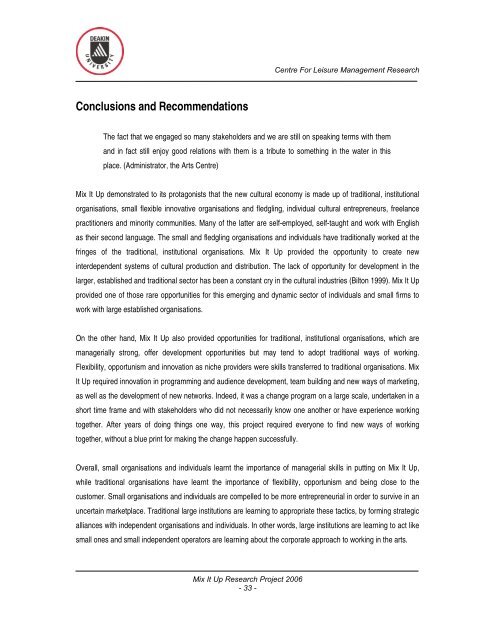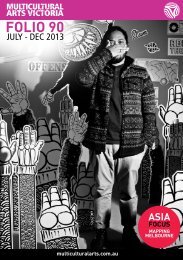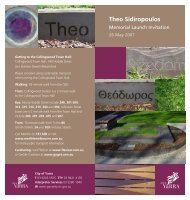Mix It Up Project Report: Building New Audiences - Multicultural Arts ...
Mix It Up Project Report: Building New Audiences - Multicultural Arts ...
Mix It Up Project Report: Building New Audiences - Multicultural Arts ...
Create successful ePaper yourself
Turn your PDF publications into a flip-book with our unique Google optimized e-Paper software.
Conclusions and Recommendations<br />
<strong>Mix</strong> <strong>It</strong> <strong>Up</strong> Research <strong>Project</strong> 2006<br />
- 33 -<br />
Centre For Leisure Management Research<br />
The fact that we engaged so many stakeholders and we are still on speaking terms with them<br />
and in fact still enjoy good relations with them is a tribute to something in the water in this<br />
place. (Administrator, the <strong>Arts</strong> Centre)<br />
<strong>Mix</strong> <strong>It</strong> <strong>Up</strong> demonstrated to its protagonists that the new cultural economy is made up of traditional, institutional<br />
organisations, small flexible innovative organisations and fledgling, individual cultural entrepreneurs, freelance<br />
practitioners and minority communities. Many of the latter are self-employed, self-taught and work with English<br />
as their second language. The small and fledgling organisations and individuals have traditionally worked at the<br />
fringes of the traditional, institutional organisations. <strong>Mix</strong> <strong>It</strong> <strong>Up</strong> provided the opportunity to create new<br />
interdependent systems of cultural production and distribution. The lack of opportunity for development in the<br />
larger, established and traditional sector has been a constant cry in the cultural industries (Bilton 1999). <strong>Mix</strong> <strong>It</strong> <strong>Up</strong><br />
provided one of those rare opportunities for this emerging and dynamic sector of individuals and small firms to<br />
work with large established organisations.<br />
On the other hand, <strong>Mix</strong> <strong>It</strong> <strong>Up</strong> also provided opportunities for traditional, institutional organisations, which are<br />
managerially strong, offer development opportunities but may tend to adopt traditional ways of working.<br />
Flexibility, opportunism and innovation as niche providers were skills transferred to traditional organisations. <strong>Mix</strong><br />
<strong>It</strong> <strong>Up</strong> required innovation in programming and audience development, team building and new ways of marketing,<br />
as well as the development of new networks. Indeed, it was a change program on a large scale, undertaken in a<br />
short time frame and with stakeholders who did not necessarily know one another or have experience working<br />
together. After years of doing things one way, this project required everyone to find new ways of working<br />
together, without a blue print for making the change happen successfully.<br />
Overall, small organisations and individuals learnt the importance of managerial skills in putting on <strong>Mix</strong> <strong>It</strong> <strong>Up</strong>,<br />
while traditional organisations have learnt the importance of flexibility, opportunism and being close to the<br />
customer. Small organisations and individuals are compelled to be more entrepreneurial in order to survive in an<br />
uncertain marketplace. Traditional large institutions are learning to appropriate these tactics, by forming strategic<br />
alliances with independent organisations and individuals. In other words, large institutions are learning to act like<br />
small ones and small independent operators are learning about the corporate approach to working in the arts.




